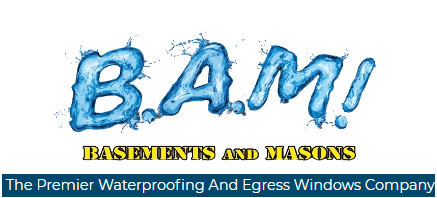Since the heat rises, basements are usually colder than the upper levels of your home. However, going downstairs should not feel like a visit to Antarctica. Having a major temperature difference between the main floor and the basement isn’t just uncomfortable for you; it can also have some negative consequences for your home and your health.
BAM Basements and Masons is a family-owned and operated company that specializes in foundation repair and waterproofing. Since we opened our doors in 2012, we’ve helped thousands of homeowners preserve and protect their greatest investment. We provide whole-home solutions to our customers, repairing damage, preventing new issues from developing, and helping people reach their short and long-term goals for their homes.
In this article, we’re going to review five ways you can reduce the chill factor in the basement while also improving your health and the stability of your home.
Check Your Furnace
This one may seem obvious, but you need regular preventative maintenance performed on your HVAC system. It’s important that your HVAC equipment is efficient and well-maintained, but it also needs to be the right size for your home. If the HVAC is too small, it will have to work harder and run more often to reach the temperature.
Overworking an HVAC is a problem for multiple reasons. First, when it runs constantly, your utility bills will be painfully high. And second, an overworked piece of equipment is likely to burn out, forcing you to spend money on repairs or a replacement. If you do need to buy a new HVAC, make sure you check with your furnace contractor and local utilities. There are often tax breaks or other incentives to help homeowners offset costs when they install more energy-efficient equipment.
There are a variety of portable space heaters available also to help combat the cold, all much safer than the kerosene-powered type our parents used. But they should still be used with caution. Never leave a space heater running unattended, plug it directly into a wall outlet (no extension cords), and keep the space around it clear of obstruction. There are many items that may not be truly flammable that can still melt or smoke; the fumes this gives off can be harmful.
Add Insulation to Basement walls
Basements often don’t have insulation installed, because several inches of concrete are a pretty good insulator on its own. But drafts can form through cracks in foundations.
We recommend that you install spray foam insulation between the joists instead of the old school fiberglass type. There are a number of reasons why. Spray foam repels water, while fiberglass insulation absorbs moisture. Spray foam begins as a liquid, which means it can reach into and fill every single crack or gap without needing to be fastened in place. Fiberglass needs fasteners, and these often fail over time. We see this often in crawl spaces, where fiberglass insulation is a major problem.
Find and Repair Foundation Cracks
Foundation cracks are an issue all by themselves because they indicate structural problems like uneven settling. They can also be caused by hydrostatic pressure, which is created by water over-saturating the ground.
Once foundation cracks start to let in cold air and moisture, you have even bigger problems. Cracks large enough to allow intrusion will keep widening, which further damages the foundation while also making your basement cold and damp.
Repairing cracks is best done with epoxy, as long as the wall isn’t bowing or shearing. If the wall is starting to move. If water is getting into your basement, water drainage is an important option as well. Moisture or water intrusion will lead to other, health-related issues. If you regularly have moisture in your basement? You have mold, mildew, or other biological growth developing.
Install a Dehumidifier
You may be thinking, why do I need a dehumidifier in the winter? But moisture can be a problem year-round. It can seep in through cracks in your foundation, or even through the concrete walls themselves. Remember, concrete is a porous material; this means if it tries hard enough, water can find its way through your walls.
Condensation is also another source of moisture in a basement. Whenever there’s a contrast between the temperature of the ground outside and the foundation inside, condensation is going to form. This is another nutrient source for the biological growth we mentioned in the previous section. A dehumidifier can keep this moisture in check, which can be essential for your health.
You must be wondering by now what humidity should be in a home environment? The ideal home humidity range is around 30-45%, and it can occasionally reach the 50% mark. But the exact amount of humidity depends heavily on the seasons. During the summers, a humidity of between 30-45% would be ideal, while a relative humidity of below 40% can suffice in winters. Greater humidity levels in winters can lead to condensation issues. With this percentage of humidity in our air, all sorts of allergens, bacteria, viruses, and fungi are discouraged or outright destroyed.
Basement Wall Encapsulation
Many homeowners think encapsulation is something only used in crawl spaces. But this isn’t true; encapsulation is an excellent solution for many basements. If you have water intrusion on your basement walls, or you’re considering converting part of your basement into a finished space, encapsulation will keep the moisture close to the wall and route it down into the installed water drainage system.
Additionally, if you have an older home with a brick or stone foundation, Encapsulation is the ideal way to keep your basement clean and dry. Brick and mortar are more porous than concrete, so if you have water intrusion in a brick or stone basement, you can expect water to make a regular appearance.
Do You Need Your Basement Repaired, Waterproofed Or Encapsulated?
Here at BAM basements and Masons of Des Moines we pride ourselves on delivering every consideration to total customer satisfaction with the highest quality workmanship, limited lifetime warranties, having over 100 years combined of expertise on waterproofing, we are locally founded, owned, and operated. Call us for all your waterproofing needs and we will find a customized solution to fit your home’s needs. BAM Basements and Masons of Des Moines is your premier basement egress window company serving the Des Moines, Iowa area. If you’re located in Des Moines, Ankeny, Bondurant, Altoona, Pleasant hill, Ames, Adel, Waukee, Indianola, Grimes, Urbandale, Johnston, West Des Moines, or the surrounding areas, we’re the place to call.


